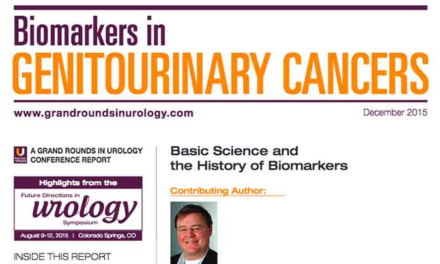Matthew R. Cooperberg, MD, MPH, presented “Forward Progress in Molecular Markers for Prostate Cancer” during the 33rd International Prostate Cancer Update on January 23, 2023, in Vail, Colorado.
How to cite: Cooperberg, Matthew R. “Forward Progress in Molecular Markers for Prostate Cancer.” January 23, 2023. Accessed Apr 2025. https://grandroundsinurology.com/forward-progress-in-molecular-markers-for-prostate-cancer/
Forward Progress in Molecular Markers for Prostate Cancer – Summary
Matthew R. Cooperberg, MD, MPH, Professor of Urology and Epidemiology & Biostatistics at the University of California, San Francisco, suggests pre-diagnosis, PSA is one of the best cancer markers ever studied, we just haven’t used it properly. In contrast, PIRADS remains too inconsistent, differing depending on which person reads the test. Cooperberg argues improvement on Gleason score alone or on AUA/NCCN risk groups, and how to integrate tissue/liquid markers with imaging, is not well defined. He denotes NCCN risk groups as outdated and cumbersome due to the different criteria in each box, and that AUA eliminates low-risk groups. Cooperberg gives an example of two patients classified the same under NCCN groups that would not receive the same treatment, suggesting you can sub-stratify risk without using markers. He recommends active surveillance as the management strategy for low-risk disease in 2023. Biomarkers can help avoid diagnosing Grade Group (GG) 1, as it is not technically cancer, and identify which GG2 can’t be surveilled. Overall biomarkers improve risk prediction, but variation in the use of biomarkers and how results should be communicated skews patients’ ability to make educated decisions. The crux of his argument for biomarkers is for their use to persuade primary care physicians that we’re not interested in overdiagnosing and overtreating low-risk disease, which will convince them to screen higher quantities of patients earlier.
About The 33rd Annual International Prostate Cancer Update:
The International Prostate Cancer Update (IPCU), founded in 1990, is a multi-day CME conference focused on prostate cancer treatment updates with expert, international faculty. It is led by expert physicians and is designed for urologists, medical oncologists, radiation oncologists, and other healthcare professionals involved in the diagnosis and treatment of prostate cancer. The 33rd iteration of the meeting occurred January 22-25, 2023 in Vail, Colorado. To view more educational presentations from IPCU 33, visit our collection page.
ABOUT THE AUTHOR
Matthew R. Cooperberg, MD, MPH, is Professor of Urology and Epidemiology & Biostatistics and Helen Diller Family Chair in Urology at the University of California, San Francisco. He earned an undergraduate degree in English from Dartmouth College in Hanover, New Hampshire, before pursuing his MD from the Yale School of Medicine in New Haven, Connecticut. Dr. Cooperberg also earned an MPH with a concentration in Health Policy from the Yale School of Epidemiology and Public Health. He joined the faculty at UCSF in 2009, and was named a professor there in 2018.
Dr. Cooperberg’s clinical interests include the diagnosis and management of genitourinary malignancies, as well as minimally-invasive techniques to treat benign and malignant diseases. His research focus is prostate cancer, and in this area he is particularly interested in health services, risk assessment and biomarkers, comparative effectiveness of treatments, and decision support and survivorship. He is also interested in care disparities and in looking at prostate cancer as an international disease.
Dr. Cooperberg has written over 400 peer-reviewed scientific articles and is an investigator on several ongoing federal grants. He has won the Young Investigator Award from the Prostate Cancer Foundation and the American Urological Association Gold Cystoscope Award, and was also named Young Urologist of the Year in 2015. He is a Fellow of the American College of Surgeons and a member of the American Urological Association and the Society for Urologic Oncology.




